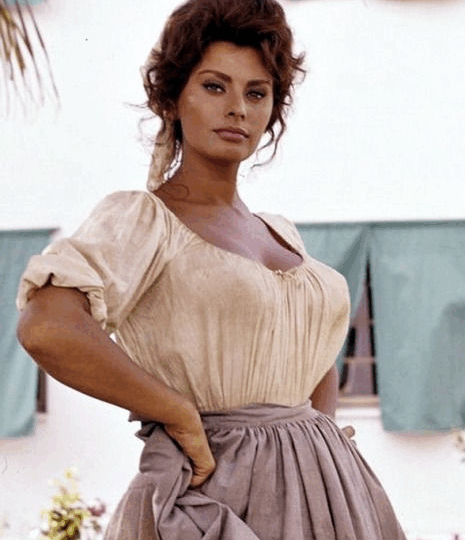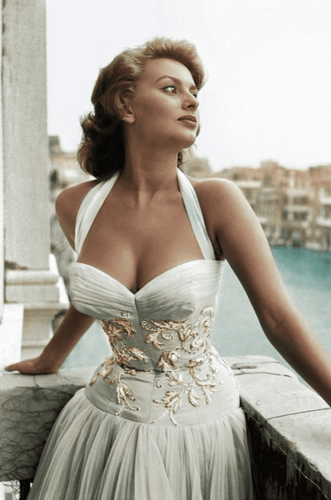Sophia Loren: A Legendary Beauty Who Mastered Both Film and Life
Every so often, a star emerges who doesn’t just shine — she changes the sky. Sophia Loren is one of those rare, extraordinary stars. An international icon, a symbol of timeless beauty, and a woman of strength, depth, and grace, her story is as inspiring as it is unforgettable. Born Sofia Villani Scicolone on September 20, 1934, in Rome, Italy, Sophia’s beginnings were anything but glamorous. Raised in Pozzuoli, a small town near Naples, she grew up during the chaos of World War II. Her early life was marked by extreme poverty, hunger, and fear, as bombs fell over southern Italy and survival became the daily goal.
Despite the hardships — or perhaps because of them — a fire was lit inside her. One that would eventually lead her from the ruins of a war-torn country to the heights of global fame. A Childhood of Hardship and Resilience. Sophia’s father, Riccardo Scicolone, abandoned the family when she was very young, leaving her mother, Romilda Villani, to raise two daughters alone in desperate conditions. They lived in overcrowded housing, shared one bedroom, and often went without food. Sophia suffered from malnutrition and illness as a child, earning the nickname “Toothpick” because of her thin frame.
Her mother, a piano teacher and aspiring actress herself, never gave up on her daughters. Romilda instilled in Sophia the value of self-belief, elegance, and pride in one’s roots — values Sophia would carry for the rest of her life. And yet, even in poverty, there was imagination. There was dreaming. There was beauty. Young Sophia was captivated by cinema, storytelling, and fashion. In the face of hunger and air raid sirens, a young girl quietly began to imagine a different kind of life — one filled with art, opportunity, and meaning.

From Pageants to Stardom: A Meteoric Rise
At just 15 years old, Sophia entered a local beauty pageant in Naples. Though she didn’t win the crown, she caught the attention of modeling scouts — and her life took its first dramatic turn. That same year, she began taking small acting roles, many of them uncredited, just to be on set and absorb everything she could.
It was around this time that she met Carlo Ponti, a film producer who would become her mentor, professional partner, and later, her husband. Ponti recognized her natural talent and encouraged her to develop her screen presence, study acting, and embrace her Italian heritage rather than try to conform to Hollywood ideals.

He also suggested a name change. And so, Sofia Scicolone became Sophia Loren — a name that would soon be known worldwide.
Her early roles in Italian cinema in the 1950s were light-hearted and often romantic, but she quickly proved she had range. Her breakout came in “The Gold of Naples” (1954), directed by Vittorio De Sica, followed by films like “Aida” (1953) and “Too Bad She’s Bad” (1954). Audiences responded not only to her beauty, but to her authenticity, vulnerability, and fierce presence.
A New Kind of Star in Hollywood
By the mid-1950s, Loren had made her way to Hollywood, where she starred opposite major figures such as Cary Grant, Clark Gable, Frank Sinatra, Anthony Quinn, and Marlon Brando. In a film industry that often favored the polished, blonde, blue-eyed “all-American” look, Sophia stood out — and proudly so. She didn’t try to mask her accent, change her look, or water down her identity.
Instead, she made it her trademark: bold, sensual, smart, and unapologetically Italian.
Her performance in “Two Women” (1960) marked a pivotal moment in her career — and in film history. Directed by Vittorio De Sica, the film told the story of a mother trying to protect her daughter in war-ravaged Italy. Sophia’s raw and devastating portrayal earned her the Academy Award for Best Actress, making her the first actor to ever win an Oscar for a foreign-language performance.
It was a turning point not just for Loren, but for international cinema as a whole. Her win signaled that talent transcends language, borders, and stereotypes.
A Love Story That Defied Convention
While Sophia was becoming one of the most recognized and respected actresses in the world, her personal life was filled with both passion and controversy. Her love for Carlo Ponti was real and profound — but complicated. Ponti was married when they met, and divorce was not easily attainable in Italy at the time. Their relationship sparked public criticism and legal complications.
After years of legal battles and annulled marriages, the couple finally married legally in France in 1966. Despite the rocky start, their union lasted over 50 years until Ponti’s death in 2007. They had two sons: Carlo Jr., a conductor, and Edoardo, a director. Sophia has always described motherhood as one of her most important roles.
She often turned down film projects to prioritize her family. Fame was never more important than love, loyalty, and the well-being of her children.
Sophia Loren’s Second Act: A Return with Purpose
Though she slowed down her career in the 1980s and 1990s, Loren never fully stepped away from acting. She chose her roles carefully, participating only in projects that resonated with her personally. She remained a towering presence in the world of cinema, fashion, and culture.
In 2020, at the age of 86, she made a triumphant return to film in “The Life Ahead”, directed by her son Edoardo. In it, she plays a Holocaust survivor and former sex worker who forms a powerful bond with a young boy from Senegal. The performance was met with widespread critical acclaim, proving once again that true artistry knows no age.
More Than a Movie Star: A Woman of Integrity
What sets Sophia Loren apart is not only her talent, beauty, or fame — but her values. Throughout her life, she has remained fiercely authentic. She refused to conform to Hollywood’s plastic expectations, choosing instead to stay rooted in her culture, her faith, and her personal sense of dignity.
She has spoken out about body image, encouraging women to embrace their natural selves. She has rejected roles that conflicted with her beliefs, and she has always carried herself with a rare blend of elegance and strength. Her famous quote, “Nothing makes a woman more beautiful than the belief that she is beautiful,” speaks volumes about her philosophy.
A Graceful Life in Her Golden Years
Now in her 90s, Sophia Loren lives a quiet life, mostly between Switzerland and Italy, surrounded by family. She enjoys cooking, especially traditional Neapolitan recipes, and remains active behind the scenes in cinema and charitable causes. Though she rarely makes public appearances, her elegance still captivates whenever she does.
Despite the passage of time, she continues to turn heads — not just for her beauty, but for the grace, dignity, and humanity she radiates.
Conclusion: A Legacy That Transcends Generations
Sophia Loren’s story is more than a tale of fame and glamour. It is the story of a woman who rose from poverty and war to become a global icon. A woman who remained true to herself, fought for love, prioritized family, and never compromised her integrity for the sake of success.
Her legacy is not only etched in the dozens of films she made — it lives on in the millions of hearts she touched. She showed the world that beauty is not just about appearance, but about resilience, confidence, courage, and kindness.
Sophia Loren did more than conquer cinema.
She conquered life.
And in doing so, she became not just an icon — but a timeless inspiration for generations to come.
Every so often, a star emerges who doesn’t just shine — she changes the sky. Sophia Loren is one of those rare, extraordinary stars. An international icon, a symbol of timeless beauty, and a woman of strength, depth, and grace, her story is as inspiring as it is unforgettable. Born Sofia Villani Scicolone on September 20, 1934, in Rome, Italy, Sophia’s beginnings were anything but glamorous. Raised in Pozzuoli, a small town near Naples, she grew up during the chaos of World War II. Her early life was marked by extreme poverty, hunger, and fear, as bombs fell over southern Italy and survival became the daily goal.
Despite the hardships — or perhaps because of them — a fire was lit inside her. One that would eventually lead her from the ruins of a war-torn country to the heights of global fame. A Childhood of Hardship and Resilience. Sophia’s father, Riccardo Scicolone, abandoned the family when she was very young, leaving her mother, Romilda Villani, to raise two daughters alone in desperate conditions. They lived in overcrowded housing, shared one bedroom, and often went without food. Sophia suffered from malnutrition and illness as a child, earning the nickname “Toothpick” because of her thin frame.
Her mother, a piano teacher and aspiring actress herself, never gave up on her daughters. Romilda instilled in Sophia the value of self-belief, elegance, and pride in one’s roots — values Sophia would carry for the rest of her life. And yet, even in poverty, there was imagination. There was dreaming. There was beauty. Young Sophia was captivated by cinema, storytelling, and fashion. In the face of hunger and air raid sirens, a young girl quietly began to imagine a different kind of life — one filled with art, opportunity, and meaning.

From Pageants to Stardom: A Meteoric Rise
At just 15 years old, Sophia entered a local beauty pageant in Naples. Though she didn’t win the crown, she caught the attention of modeling scouts — and her life took its first dramatic turn. That same year, she began taking small acting roles, many of them uncredited, just to be on set and absorb everything she could.
It was around this time that she met Carlo Ponti, a film producer who would become her mentor, professional partner, and later, her husband. Ponti recognized her natural talent and encouraged her to develop her screen presence, study acting, and embrace her Italian heritage rather than try to conform to Hollywood ideals.

He also suggested a name change. And so, Sofia Scicolone became Sophia Loren — a name that would soon be known worldwide.
Her early roles in Italian cinema in the 1950s were light-hearted and often romantic, but she quickly proved she had range. Her breakout came in “The Gold of Naples” (1954), directed by Vittorio De Sica, followed by films like “Aida” (1953) and “Too Bad She’s Bad” (1954). Audiences responded not only to her beauty, but to her authenticity, vulnerability, and fierce presence.
A New Kind of Star in Hollywood
By the mid-1950s, Loren had made her way to Hollywood, where she starred opposite major figures such as Cary Grant, Clark Gable, Frank Sinatra, Anthony Quinn, and Marlon Brando. In a film industry that often favored the polished, blonde, blue-eyed “all-American” look, Sophia stood out — and proudly so. She didn’t try to mask her accent, change her look, or water down her identity.
Instead, she made it her trademark: bold, sensual, smart, and unapologetically Italian.
Her performance in “Two Women” (1960) marked a pivotal moment in her career — and in film history. Directed by Vittorio De Sica, the film told the story of a mother trying to protect her daughter in war-ravaged Italy. Sophia’s raw and devastating portrayal earned her the Academy Award for Best Actress, making her the first actor to ever win an Oscar for a foreign-language performance.
It was a turning point not just for Loren, but for international cinema as a whole. Her win signaled that talent transcends language, borders, and stereotypes.
A Love Story That Defied Convention
While Sophia was becoming one of the most recognized and respected actresses in the world, her personal life was filled with both passion and controversy. Her love for Carlo Ponti was real and profound — but complicated. Ponti was married when they met, and divorce was not easily attainable in Italy at the time. Their relationship sparked public criticism and legal complications.
After years of legal battles and annulled marriages, the couple finally married legally in France in 1966. Despite the rocky start, their union lasted over 50 years until Ponti’s death in 2007. They had two sons: Carlo Jr., a conductor, and Edoardo, a director. Sophia has always described motherhood as one of her most important roles.
She often turned down film projects to prioritize her family. Fame was never more important than love, loyalty, and the well-being of her children.
Sophia Loren’s Second Act: A Return with Purpose
Though she slowed down her career in the 1980s and 1990s, Loren never fully stepped away from acting. She chose her roles carefully, participating only in projects that resonated with her personally. She remained a towering presence in the world of cinema, fashion, and culture.
In 2020, at the age of 86, she made a triumphant return to film in “The Life Ahead”, directed by her son Edoardo. In it, she plays a Holocaust survivor and former sex worker who forms a powerful bond with a young boy from Senegal. The performance was met with widespread critical acclaim, proving once again that true artistry knows no age.
More Than a Movie Star: A Woman of Integrity
What sets Sophia Loren apart is not only her talent, beauty, or fame — but her values. Throughout her life, she has remained fiercely authentic. She refused to conform to Hollywood’s plastic expectations, choosing instead to stay rooted in her culture, her faith, and her personal sense of dignity.
She has spoken out about body image, encouraging women to embrace their natural selves. She has rejected roles that conflicted with her beliefs, and she has always carried herself with a rare blend of elegance and strength. Her famous quote, “Nothing makes a woman more beautiful than the belief that she is beautiful,” speaks volumes about her philosophy.
A Graceful Life in Her Golden Years
Now in her 90s, Sophia Loren lives a quiet life, mostly between Switzerland and Italy, surrounded by family. She enjoys cooking, especially traditional Neapolitan recipes, and remains active behind the scenes in cinema and charitable causes. Though she rarely makes public appearances, her elegance still captivates whenever she does.
Despite the passage of time, she continues to turn heads — not just for her beauty, but for the grace, dignity, and humanity she radiates.
Conclusion: A Legacy That Transcends Generations
Sophia Loren’s story is more than a tale of fame and glamour. It is the story of a woman who rose from poverty and war to become a global icon. A woman who remained true to herself, fought for love, prioritized family, and never compromised her integrity for the sake of success.
Her legacy is not only etched in the dozens of films she made — it lives on in the millions of hearts she touched. She showed the world that beauty is not just about appearance, but about resilience, confidence, courage, and kindness.




